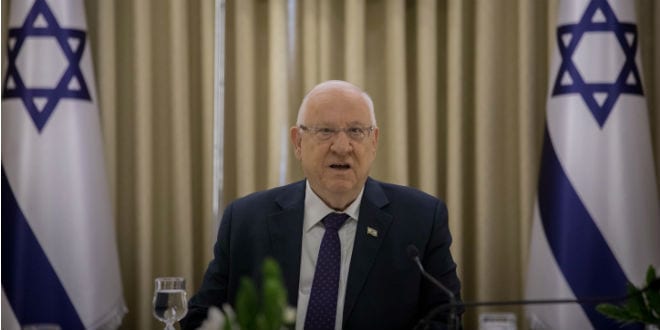Israel’s President Reuven Rivlin has begun consultations with the heads of the country’s political factions, in an attempt to expedite the formation of the government.
It is widely expected, though by no means a fait accompli, that Israel’s current Prime Minister Benjamin Netanyahu will be tasked with attempting to construct a ruling coalition.
The process is being broadcast live – via Facebook – a first for the State of Israel, in an effort to promote transparency. Rivlin began the process by saying, “The president doesn’t pick the PM, the sovereign does and the sovereign is the public. The president picks the MK with the best chance to form a government.”
Rivlin met with each of the parties at his Jerusalem residence and received their recommendations for a candidate to form and lead the next government.
Party representatives were received in descending order of seats won in the hard-fought and often times bitter April 9 vote, which saw Netanyahu’s Likud party secure a narrow one-seat victory over the centrist Blue & White alliance led by former army chief Benny Gantz.
Rivlin met party leaders from the following factions; Likud, followed by Blue & White, ultra-Orthodox factions Shas and United Torah Judaism (UTJ) and the Arab Hadash-Ta’al party. Deliberations and meetings will continue into Tuesday, with representatives of the Labor party, secular-nationalist Yisrael Beiteinu, the far-right United Right party, left-wing Meretz, center-right Kulanu and the Arab Ra’am-Balad faction.

The leader of the party deemed the most likely to form a majority coalition has up to 42 days (28 days according to the quasi-constitutional Basic Laws and an additional 14 days at the President’s discretion) to negotiate with the different parties, and then present his or her government to the Knesset for a vote of confidence. If the Knesset approves the proposed government (by a vote of at least 61 members).
As expected, the ultra-Orthodox parties, Kulanu, and the URWP all recommended Netanyahu, giving him a total of 60 mandates. However, former defense minister Avigdor Lieberman, whose sudden resignation over a difference of policy regarding Gaza was partly responsible for the calling of elections, has yet to confirm whether he will sit in a Netanyahu-led government. As leader of a staunchly secular party, Lieberman also has philosophical issues with the ultra-Orthodox parties, particularly over the exempting religious students from mandatory service in Israel’s military.
Rivlin asked the Blue and White leadership whether they would consider sitting in a unity government, to which former chief of staff Gabi Ashkenazi responded, “Honestly we asked ourselves that question and after deep thinking it through, we think with the current political considerations, we can’t sit in a government led by someone else [Netanyahu].”
Source: Israel in the News

